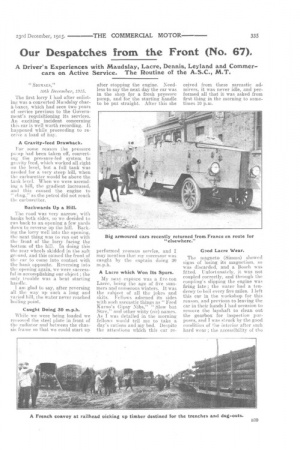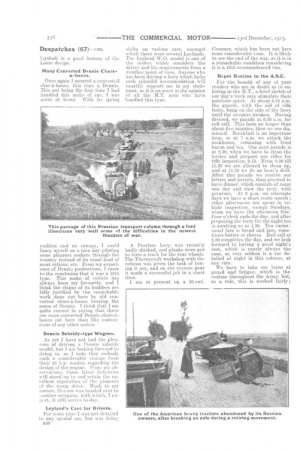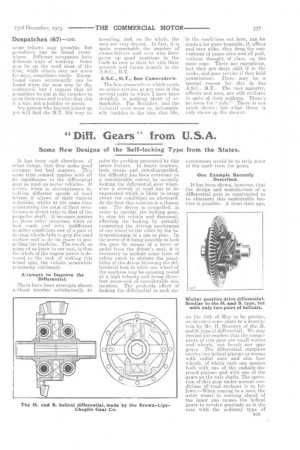Our Despatches from the Front (No. 67).
Page 11

Page 12

Page 13

If you've noticed an error in this article please click here to report it so we can fix it.
A Driver's Experiences with Maudslay, Lacre, Dennis, Leyland and Commercars on Active Service. The Routine of the A.S.C., M.T.
11 SIGNALS,"
loth December, 1015.
The first lorry I had after enlisting was a converted Maul:Islay charL-nancs, which had seen two years of service previous to the Government's requisitioning its services. An exciting incident concerning this ear is well worth recording. It happened while proceeding to receive a load of hay.
A Gravity-feed Drawback.
For some reason the pressure pump had been taken off, converting the pressure-fed system to gravity feed. which worked all right on the level, but a full tank was needed for a very steep hill, when the carburetter would be above the. tank level. When we were ascending a hill, the gradient increased, and this caused the engine to " chug," as the petrol did not reach the carburetter.
Backwards Up a Hill.
The road was very narrow, with banks both sides, so we decided to TlPt back to an opening a few yardS down to reverse up the hill. Backing, the lorry well into the opening, the next thing was to run out with the front of the lorry facing the bottom of the hill, In doing this the rear wheels skidded in the soft. ground, and this caused the front of the ear to come into contact with the bank opposite. Reversing into the opening again, we were successful in accomplishing our object ; the only trouble was a bent starting handle.
am glad to say, after reversing all the way up such a long and varied hill, the water never reached boiling point.
Caught Doing 30 m.p.h.
While we were being loaded we removed the steel plate in front of the radiator and between the chassis frame so that we could start up after stopping the engine. Needless to say the next day the car was in the shop for a fresh Pr sure pump, and for the starting handle to be put straight. After this she performed yeoman service, and I may mention that my successor was caught by the captain doing 30 A Lacre which Won Its Spurs.
My next capture was a five-ton -Lacre, being the age of five summers and numerous winters. It was the subject of all the jokes and skits. Fellows adorned its sides with such sarcastic things as " Fred Karno's Gipsy Nibs," " Slow but Sure," and other witty (sic) names. As I was detailed in the morning fellows would tell me to take a day's rations and my bed. Despite the attentions which this car re
ceived from these sarcastic adnnrers, it was never idle., and performed all that it was asked from first thing in the morning to sometimes 10 p.m.
Good Lacre Wear.
The magneto (Simms) showed signs of losing its magnetism, so was discarded, and a Bosch was fitted. Unfortunately, it was not coupled correctly, and through the coupling's slipping the engine was firing late ; the water had a tendency to boil every five miles. I left this car in the workshop for this reason, and previous to leaving the car in their hands I had occasion to remove the layshaft to clean out the gearbox for inspection purposes, and I was struck by the good condition of the interior after such hard wear ; the accessibility of tho layshaft is a good feature of the Lacre design.
Many Converted Dennis Chars. a-bancs.
Once again I secured a converted char-a-banes, this time a Dennis. This not being the first time I had handled this make of car, I was quite at home. With its spring
cushion and no canopy, I could fancy myself on a nice day piloting . some pleasure seekers through the country instead of its usual load of meat rations, etc. From 'myexperience of Dennis productions, I came to the conclusion that it was a 1913 type. This make of vehicle has always been my favourite, and I think the claims of its builders are fully justified by the remarkable work done out here by old converted chars-a-banes bearing the name of Dennis. I think that I am quite correct in saying that there are more converted Dennis chars-hbanes out here than like conversions of any other makes.
Dennis Subsidy-type Wagons.
As yet I have not had the pleasure of driving a Dennis subsidy model, but I .ain looking forward to doing so, as I note they embody such a considerable change from their 28 h.p. models regarding the design of the engine. From my observations, these latest deliveries will stand up to and retain the excellent reputation of the pioneers of the worm drive. Much to my sorrow, this car -was handed over to another company, with which, I expect, it still serves lo-day.
Leyland's Care for Drivers. For some time I was not detailed to any special car, but was doing B40 shifts on various cars, amongst which there were several Leylands. The Leyland W.O. model is one of the makes which considers the driver and his requirements from a weather point of view. Anyone who has been driving a lorry which lacks such splendid accommodation will heartily support me in my statement, as it is an asset in the opinion of all the M.T, men who have handled this type.
A Peerless lorry was recently badly ditched, and planks were put to form a track for the rear wheels. The Thornycroft workshop with the column was given the task of towing it out and -on the reverse gear it made a successful job in a short time.
I ant at present on a 30-cwt. Commer, which has been out here some considerable time. It is likely to see the end of the war, as it is in a remarkable condition considering it is a 1913 commandeeled van.
Depot Routine in the A.S.C.
For the benefit of any of your readers who are in doubt as to enlisting in the MT., a brief sketch of our day's work may stimulate their patriotic spirit. At about 5.45 a. in, the guards, with the aid of rifle butts, bang On the side of the lorry until the sleepers awaken. Having dressed, we parade at 6.30 a.m. for roll c,all. This lasts no longer than about five minutes, then we are dismissed. Breakfast is an important item, so at 7 a.m. we attack the icookhou-se, returning with fried bacon and tea. Our next parade is at 8.30, when we have to clean -the lorries and prepare our rifles for rifle inspection, 9.15. From 9.30 till 11.30 we are allowed to clean up, and at 11.30 we do an hour's drill. After this parade we receive our letters and parcels, then proceed to have dinner, which consists of roast one day and stew the next, with potatoes. At 2 p.m. on alternate days we have a short route march ; other afternoons are spent in vehicle inspection, except Sundays, when we have the afternoon free. Four o'clock ends the day, and after preparing the lorry for the night tea is awaiting us at 4.30. Tea varies': -usual fare is bread and jam, sometimes butter or cheese. Roll call at 8.30 completes the day, and we look forward to having a good night's rest, which is nearly always the case, as very seldom is a car detailed at night in this column, at any rate.
We have to take our turns at guard and fatigue, which is the routine throughout the Army, but, as a rule, this is worked fairly; some fellows nifty grumble, but grumblers can be found everywhere. Different companies have different ways of working. Some may be on the road most of the time, while others may not move for days, sometimes weeks. Exceptional cases occasionally can be found when the men may be tented but suggest that all grumblers be put in the trenches to open their eyes and realize that this is a war, not a holiday or picnic.
Any person who has not joined up yet will find the M.T. life very in teresting, and, en the whole, the men are very decent. In fact, it is quite remarkable the number of owner-drivers and men who have given up good positions in the trade to cast in their lot with their present and future friends in the A . S. C., MT.
A.S.C., M.T., Bon Camaraderie, The on camaraderie which exists on active service, at any rate in the several units to which I have been detailed, is nothing short of remarkable. The Britisher, and the Colonial even more so, automatically tumbles to the idea that life,
in the conditions out here, can be made a lot more bearable, if, officer and man alike, they drop the conventions of peace-time and all pull, without thought of class, on the same rope. There are, exceptions, but they get short shift if in the ranks, and poor service if they hold commissions. There may be a special reason for this in the A.S.C., M.T. The vast majority, officers and men., are still civilians in spite of their uniform. There's no room for "side." There is not much shown ; but what there is only shows up the shower,








































